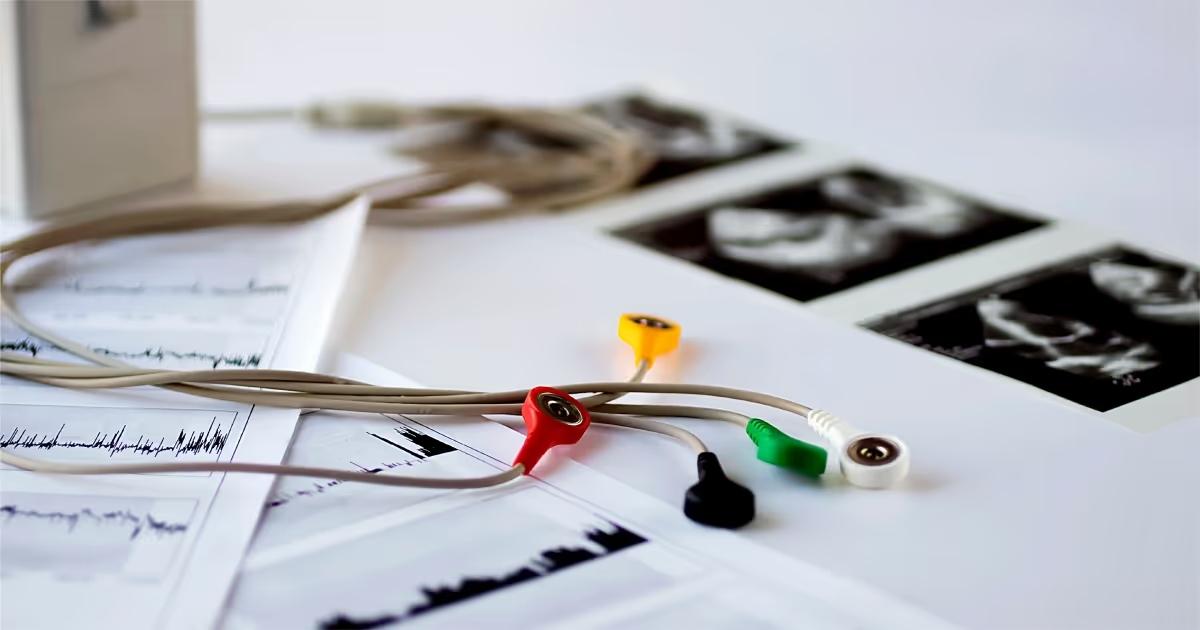Holter monitor เครื่องบันทึกคลื่นไฟฟ้าหัวใจ 24 ชั่วโมง
Holter monitor หรือ เครื่องบันทึกคลื่นไฟฟ้าหัวใจ 24 ชั่วโมง เป็นอุปกรณ์ตรวจคลื่นไฟฟ้าหัวใจแบบพกพาและสวมใส่ได้เพื่อบันทึกการเต้นของหัวใจและตรวจหาจังหวะการเต้นของหัวใจที่ผิดปกติ ภาวะหัวใจเต้นผิดจังหวะบางประเภทนั้นเกิดขึ้นเพียงครั้งคราวทำให้การตรวจคลื่นไฟฟ้าหัวใจแบบปกติ (EKG) ในช่วงเวลาสั้น ๆ ไม่สามารถตรวจพบความผิดปกตินั้นได้ ดังนั้นแพทย์จึงอาจให้ผู้ป่วยสวมใส่เครื่อง Holter monitor เพื่อตรวจจับการเต้นของหัวใจที่ผิดปกติดังกล่าว
เมื่อไรที่ต้องใส่เครื่อง Holter monitor
เมื่อเข้ารับการตรวจ แพทย์จะทำการตรวจคลื่นไฟฟ้าหัวใจ (EKG) เพื่อประเมินจังหวะการเต้นของหัวใจ หากมีสัญญาณของภาวะหัวใจเต้นผิดจังหวะที่เกิดขึ้นไม่บ่อย แพทย์จะให้ผู้ป่วยสวมใส่เครื่อง Holter monitor เป็นเวลา 1-2 วัน ผู้ป่วยรายที่มีอาการไม่บ่อยอาจพิจารณาตรวจด้วยเครื่องบันทึกคลื่นไฟฟ้าหัวใจ Cardiac Event Recorder เป็นเวลา 2-3 สัปดาห์แทนหากเครื่อง Holter monitor ไม่สามารถตรวจจับการเต้นของหัวใจที่ผิดปกติได้
ผู้ป่วยที่หมดสติโดยไม่มีสาเหตุ มีอาการของภาวะหัวใจเต้นผิดจังหวะ หรือเป็นโรคหัวใจที่อาจนำไปสู่ภาวะหัวใจเต้นผิดจังหวะ แพทย์อาจแนะนำให้ใส่เครื่อง Holter monitor
ผู้ป่วยควรเตรียมตัวอย่างไรใส่เครื่อง Holter monitor
ก่อนเข้าพบแพทย์เพื่อติดเครื่อง Holter monitor ควรอาบน้ำทำความสะอาดร่างกายให้หมดจดเนื่องจากหลังติดเครื่องแล้วจะนำเครื่องออกไม่ได้จนกว่าการบันทึกจะเสร็จสิ้น ซึ่งจะกินเวลา 1-2 วัน
พยาบาลจะทำความสะอาดหรือโกนขนหน้าอกออกเพื่อให้สามารถติดแผ่นขั้วไฟฟ้าได้ แผ่นขั้วไฟฟ้านั้นจะมีสายไฟเชื่อมต่อกับเครื่อง Holter monitor ซึ่งมีขนาดประมาณ 3.5 นิ้ว x 2.5 นิ้ว (ประมาณสํารับไพ่) เมื่อติดตั้งเครื่อง Holter monitor แล้ว แพทย์จะทำการอธิบายและให้คำแนะนำเพิ่มเติม ผู้ป่วยสามารถทำกิจวัตรประจําวันได้ตามปกติ
ขณะสวมใส่เครื่อง Holter monitor ผู้ป่วยควรทำอะไรบ้าง
- เปิดเครื่องและสวมเครื่อง Holter monitor ตลอดเวลา รวมถึงขณะที่นอนหลับ
- ระวังไม่ให้เครื่องโดนน้ำและงดอาบน้ำจนกว่าการบันทึกคลื่นไฟฟ้าหัวใจจะเสร็จสิ้น
- จดบันทึกเวลาและกิจกรรมที่ทำขณะสวมเครื่อง Holter monitor
- จดบันทึกอาการที่มี โดยเฉพาะอย่างยิ่งอาการใจสั่น หัวใจเต้นผิดจังหวะ เจ็บหน้าอก และเวียนศีรษะ
ขณะสวมใส่เครื่อง Holter monitor อาจเกิดความเสี่ยงอะไรได้บ้าง
เครื่อง Holter monitor เป็นอุปกรณ์ที่ไม่ก่อให้เกิดความเจ็บปวดและไม่ลุกล้ำเข้าไปในร่างกาย จึงไม่ก่อให้เกิดความเสี่ยงใด ๆ ที่รุนแรง แต่ผู้ป่วยบางรายอาจรู้สึกระคายเคืองที่ผิวหนังหรือไม่สบายตัวบริเวณที่ติดแผ่นขั้วไฟฟ้า
โดยปกติแล้วเครื่องใช้ไฟฟ้าภายในบ้านจะไม่ส่งคลื่นไฟฟ้ารบกวนตัวอุปกรณ์ แต่การใช้อุปกรณ์ไฟฟ้าบางชนิดใกล้กับเครื่อง Holter monitor อาจส่งผลให้เครื่องอ่านค่าคลื่นไฟฟ้าหัวใจผิดได้ จึงแนะนำให้หลีกเลี่ยงการอยู่ใกล้อุปกรณ์ไฟฟ้าเหล่านี้
- โทรศัพท์มือถือ
- ผ้าห่มไฟฟ้า มีดโกนไฟฟ้า และแปรงสีฟันไฟฟ้า
- แม่เหล็ก
- เครื่องตรวจจับโลหะ
- เตาอบไมโครเวฟ
- เครื่องเล่นเพลงแบบพกพา
จะทราบผลตรวจเมื่อไร
เมื่อการตรวจสอบการเต้นของหัวใจเสร็จสิ้นสมบูรณ์ (ใช้เวลาประมาณ 1-2 วัน) แพทย์จะนัดให้นำเครื่อง Holter monitor และบันทึกประจำวันที่ได้จดบันทึกไว้มามอบให้แก่แพทย์ โดยแพทย์จะทำการตรวจสอบข้อมูลดังกล่าวและพูดคุยกับผู้ป่วย ผลที่ได้จะแสดงให้เห็นว่าผู้ป่วยเป็นโรคหัวใจหรือไม่ หากยังวินิจฉัยไม่ได้เนื่องจากอาการเกิดไม่บ่อย แพทย์อาจแนะนำให้ใช้เครื่อง Cardiac Event Recorder ซึ่งผู้ป่วยจะต้องกดปุ่มบันทึกเมื่อมีอาการที่อาจเกี่ยวข้องกับภาวะการเต้นของหัวใจผิดปกติ ซึ่งสามารถใช้งานต่อเนื่องได้นานถึง 2-3 สัปดาห์




